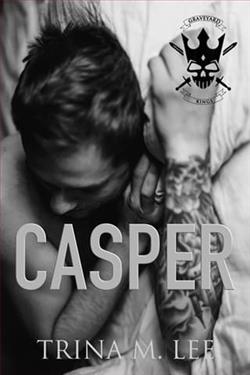Page 37 of Triple Threat
“No credit cards, no employment records for at least the last six years, no driver’s license or even local ID. Your records start with birth, a few vaccination records, and a few years of public education and then an incomplete filling with the Maryland Department of Health and Social Services. They had butterfingers and dropped you through the proverbial cracks. There’s simply nothing after your eighteenth birthday. I can only guess what you’ve been up too since your last known record entry, which was working for a downtown café,” I said.
“Surviving,” she said softly. “Just surviving. Avoiding the bad people, avoiding the police, avoiding people who look at me the wrong way, and then I wake up here, with literally nothing. I had a bag, just about everything I owned in the world was in it, and a small box, back where I was sleeping. Not much, but some old photos, important photos.”
“I think I can arrange for finding your things, if it was stowed somewhere safe and hidden,” I said. If Lach wouldn’t, I would go look for it, I would. The girl had nothing else.
“Kyle is a murderer,” she said softly, her dark and lovely eyes distant, somber, as the reality overtook her.
“No,” I said with conviction. “Kyle and I aremercenaries; we don’t go around killing just anybody. Especially innocent people.” She gave me a critical look that I thought bore some further explanation. “Kyle and I were both in the military, and after the military, we kept the same profession, just went from being government employees to being self-employed.”
“Who were those people?” she asked. If Lach truly intended to keep this woman, which I knew Lach, and I knew he did, she deserved to know.
“A splinter cell from a heroin-smuggling cartel,” I said. No reason to obfuscate things. Not now. “We were contracted by the head of the main cartel to step in and take care of their internal dispute.”
“You work for a heroin cartel?”
“One job, this time, yes. We took alotof their money for it, reduced the number of drug dealers and cartel leaders, and later, if we’re offered a contract to go deal with the cartel that hired us, we’ll do that job, too,” I said. All in all, it was a net positive for humanity by my reckoning. No need to delve further into the mathematics of it now.
“We eliminate bad guys and their organizations, and most of the time we work for other bad guys. We don’t hurt innocent people, never children, and very rarely women.” Sadie’s eyes flashed at the last.
“Only rarely?” she asked.Of course, she’s more scared than ever.I was beginning to worry my honesty was having the opposite of its desired effect.
“Women can be bad guys too, and anyone carrying a gun in a firefight is a valid target. Unarmed people don’t get shot,” I said. “I like to think that the work we do makes the world, in a small part, a better place.”
“That’s a nice way to look at it,” she said. She took another sip of the cocoa. “It’s also hard to argue with you. I meetnice peopleall the time, and they all end up being bastards. You have been one of the nicest people I’ve met, and you’re a mercenary, and Kyle is a what? A… a… hitman?” she asked finally, as she groped for the right word.
“That seems accurate,” I said.
“All those nice people out there, they would have taken advantage of me in a heartbeat, and some tried. I showed them,” she said. “I had my freedom, and nothing else. I ate out of dumpsters behind restaurants. I showered when there was a chance at the women’s shelter, but even they had theirhungry eyes, wanting me to take their pamphlets, join their church, their organization. Plenty ofnice guyswere more than willing to let me do things for money… you know,thingsfor them, and they would be so good to me and give me twenty bucks.”
“I’m aware of the type,” I said. The cocoa was good, I took a small sip.
“I always said ‘no.’” she said defensively.
“Naturally,” I agreed readily. What she had done to survive before we found her – there was no judgment.
She sank down onto the edge of the bed, carefully adjusting how she sat so she wouldn’t lose her towel, keeping her upper arms pinned to her sides to ensure it as she took a careful sip of her hot chocolate. “You’ve given me medical care, fed me, entertained me, tied me up a few times, which I didnotappreciate, mister,” she said pointedly.
“You’ve not been tied up since you tried breaking a window to get out,” I said. “It was that, more than anything, that landed you in that sort of trouble.”
“Who has bulletproof glass in their living room?” she asked softly, making eye contact, the sorrow clear in her gaze. She didn’t expect an answer – she knew the answer now – but I smiled sadly, simply, and gave one to her anyway.
“Professional mercenaries,” I said. “The Bat Cave is technically a safe room, and most of the house has a large degree of protection. In case something goes badly, there is also an escape tunnel.”
“That seems… weird, but makes sense,” she said.
“Aye,” I agreed, and told her more. “This place was built during Prohibition. The tunnels date back to when the original owners were brewing bathtub booze in the basement and then smuggling it across the Chesapeake via small boats from the beach just there. If the Feds showed up, the bootleggers used the tunnels to escape to their boats and vanish while the cops would search the house and never even find the door to the basement,” I said. “The escape tunnel leads down to a concealed dock, and we have a boat down there. We call her theRum Runner. It seemed apt.”
“And now it's full of electronics,” she said. “And you look cold in those wet clothes. Maybe you should go warm up yourself and put on something dry.”
“Sadie,” I said, offering her my hand. “I am sorry I didn’t tell you everything, but I hope you understand my reasons. Now that the big secret is out, if you have any questions, I’ll answer them.”
She laced her fingers through mine when it came to my proffered hand and gave it a squeeze, nodding, though she wouldn’t meet my eyes. Instead, she stared down into her nearly empty mug. “After you put on dry clothes,” she said, and her concern was rather touching.
Chapter Thirteen
Sadie…
The bunk beds at the Daughton’s were uncomfortable. The mattress thin, the sheets threadbare, and the blanket even thinner than that. There was no turning on the heat in the bedrooms – that cost too much electricity and Pricilla and Dean Daughton were all about ‘saving money’ despite the fact they were being paid for six of us kids, and Dean Daughton holding down a lucrative job as an Indigo City longshoreman.















